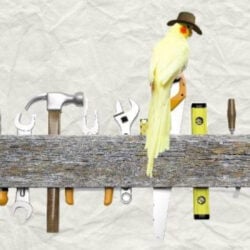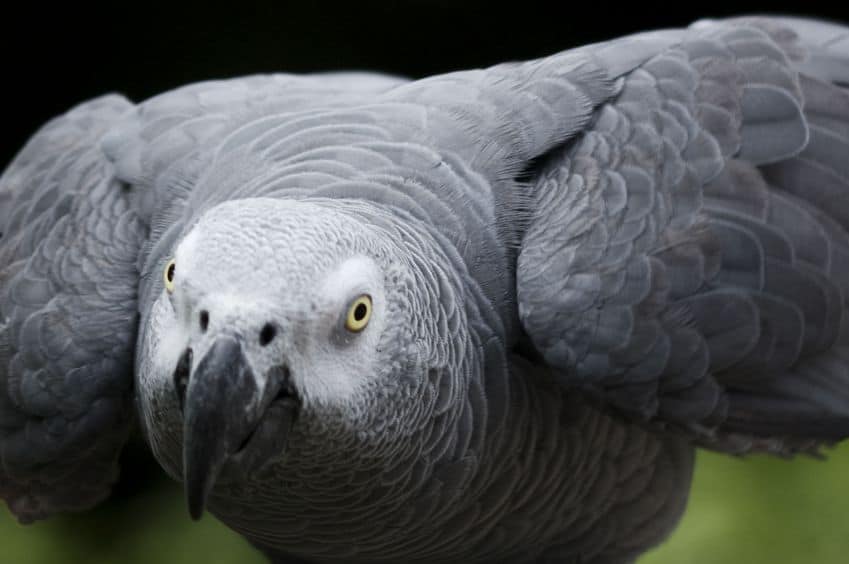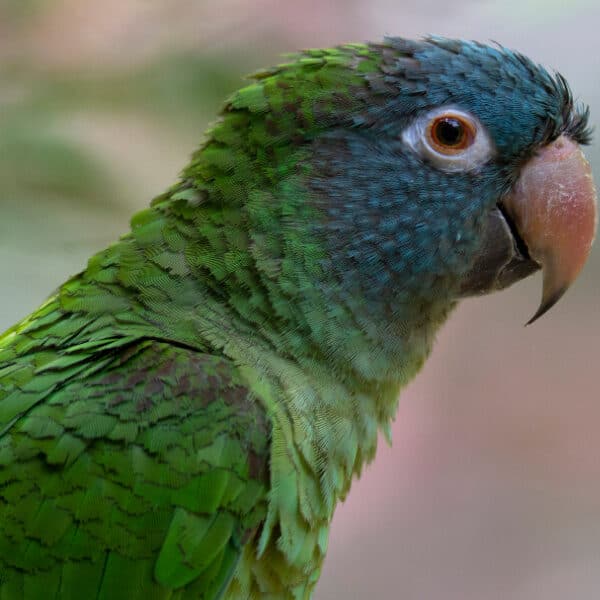Last Updated on by Mitch Rezman
This was most recent answer to that question on Quora:
“So, I did something that, again, I do not recommend for anyone else.
I got myself comfortable against the cage, and put my left hand into a balled fist, and let him hit me. Again. And again. And again.
Eventually blood ran down my elbow. He hit me 40+ times while I looked at him with my eyes half-lidded, calm & relaxed, glancing away as if bored from time to time.
After around ten minutes, Sammie stopped striking at me. He had a long pause, looking at me sideways, then with his head upside down.
Then he put a foot on my bloodied hand.”
It was also my first down vote ever against 283 up votes
What are people thinking?
This is what I would do in that situation
First of all parrots are not vicious.
Prey birds (falcon, hawks and eagles) are vicious and only have one thought on their mind “where’s my next meal coming from”?
Parrots might lash out because of their instinctual fight or flight attitude.
If they feel encroached upon and they can’t fly away they will bite you – it’s that plain and simple.
Sticking your hand in a birdcage whether it be rolled up into a fist or open palm will certainly will draw a bite.
Now that the bird knows that it’s okay to bite you repeatedly.
You have an African gray with the mind and the memory of a high-powered SSD (Solid State Drive) computer server.
The bird will always think that if I can bite a person enough I can get on their hand.
Getting bitten by a bird is never acceptable.
It is not a badge of honor.
It is an indicator that you lack control over the situation and the animal.
This has nothing to do with just taking your time, especially with an animal that may outlive you.
Parrots can tell time as precisely as a Rolex and keeping one near you for six months is not an effective approach to training any animal.
I would first start by dropping a favored treat into the food bowl from outside of the cage several times a day for a week or two.
This begins to set up the birds thinking that every time you walk by something good will happen.
Next I would install a grooming perch (something with a rough surface) on the inside of the cage door.
This allows you to open the door to let the birds step onto the perch thus while leaving the cage they are still on the cage close to the inside of their familiar home.
Continue to offer treats even when the bird is on a perch. To avoid a bite place a single treat into the food dish so fingers are not exposed.
With every visit I would have a towel draped over my shoulder so the bird gets used to seeing the towel.
With the bird potentially being able to leave the cage altogether, having the towel ensures that you can drop it over the bird to capture it.
Using conventional means as seen in this video produced by veterinarians once under the towel you can place your index finger and thumb around the birds neck with no threat to the birds help and restrain it in a way that the bird is free to move but you avoid any bite whatsoever.
Before I begin to try to handle the bird, this would be a good time to start clicker training.
https://www.youtube.com/watch?v=OUaVdivyDsQ
Your next visit the bird on the cage door perch will be with the treat a target second clicker.
This time start with the target stick and once the bird makes it, click and offer the treats.
Repeat this six or eight times daily.
Next step in testing the waters is seeing if the bird will step up to another perch using the command step up.
The bird does it again click offer a treat.
After a few days of that we can now test the waters to see if the bird will step up on our hand without aggression.
If the bird goes to bite, close him or her up in the cage and walk away to the next day no more treats to be offered that day.
Repeat the procedure until you are able to get the bird to step up on your hand without trying to bite you first.
This will take time and patience but at least now you have a method.
One of the big problems we are finding out about birds is North American light cycles stress them out.
African grays have spent millions of years on the Serengeti plains of Central Africa.
Being near the equator some light cycles common roughly 12 hours of darkness and 12 hours of light.
The erratic light cycles we live in stress a bird out far more than we give this simple task.
An easy fix is to install a full-spectrum light over the cage, as close as you can get without the bird been able to reach it.
Add a timer to the light setting it for 12 hours of light and conversely 12 hours of darkness.
You will be amazed at how this small hack can change the personality any bird for the better. Make or female.
Nutrition may also cause aggression and birds.
In our post Eclectus toe tapping and wing flipping issues we speak out other negative behavior triggers.
Although the article speaks specifically of eclectus parrots, the same triggers may relate to any species of captive bird.
We are learning about one of the foods we offer, Hagen Alternative Formula granules which is soy free is having many positive benefits to captive birds and we’re getting feedback from veterinarians.
In conclusion training takes more than simple patience.
You need to have a plan and a bird that is not stressed out from poor nutrition and bad lighting.
written by mitch rezman
approved by catherine tobsing
your zygodactyl foot note
BITING IS NEVER AN ACCEPTABLE BEHAVIOR UNDER ANY CIRCUMSTANCE
Author Profile
Latest entries
 The Traveling BirdJune 26, 2025Can You Name 5 Parrot Species That Are Living Wild in the USA?
The Traveling BirdJune 26, 2025Can You Name 5 Parrot Species That Are Living Wild in the USA? Bird BehaviorJune 26, 2025How is it Parrots Are Problem Solvers Social Animals and Even Use Tools?
Bird BehaviorJune 26, 2025How is it Parrots Are Problem Solvers Social Animals and Even Use Tools? Bird & Parrot AnatomyJune 25, 2025How a Tiny Chemical Modification Makes Parrots Nature’s Living Paintings
Bird & Parrot AnatomyJune 25, 2025How a Tiny Chemical Modification Makes Parrots Nature’s Living Paintings PigeonsJune 20, 2025How Do Parrots Thrive in Cities Outside Their Native Habitats?
PigeonsJune 20, 2025How Do Parrots Thrive in Cities Outside Their Native Habitats?





Bert
8 Apr 2018I say if you’ve got a berb that’s gettin’ bitey, then nip off to the hardware store and get some nice thick welding gloves. The bird is saying they don’t want handled by their behavior. Well, sometimes, ya gotta, and for that, you need the gloves. But, sometimes, ya don’t gotta, and playing some kind of little psychological mercy game with berb just isn’t cool. Leave berb be berb. If berb wants to come out and hang on the cool little climby-tree you built, and look out the window and have goodies and check out the world outside the cage, that’s cool, too, but cage is the safe space, and unless the building’s on fire, and/or you MUST take the bird to the vet, then make that their refuge, a place where neither you nor other household members will dare to tread, home base, their territory, kind of thing. Don’t try to force the issue, in other words, and if you’re getting bit, and you haven’t figured it out after the first or second time, then you need to go hang out with people that are good with birds and have a good relation with the animal(s). Love shouldn’t have to hurt. And, if parrots feel crowded or threatened or get a bad ‘vibe’ from YOU, they WILL bite. Also, if the berb is new to your home, give them 4-6 weeks to understand that this home is safe, welcoming, and that they’re free and stuff. I have a parrot hen who knows a few words, two of which are ‘step up’. Someone said that to her like a million times. I got her because she bites everyone(me included). But, I don’t handle her or try to unless it’s vet time. She’s happy, eating, but VERY territorial of that nest box. Parrot don’t care, it’s time to repel invaders, kind of thing. Good luck with your berbs! Remember, on scale, you’re Godzilla. 🙂
WindyCityParrot
9 Apr 2018Thank you for your thoughtful reply Bert
MaryC
9 Apr 2018Great video! I have a rescue Grey and I’ve been doing a lot of what you are recommending just naturally. I can’t wait to start with the “step up”. Top Gun (bird’s name) will choose to get on me but I would love to teach him to “step up”. He’s a great bird and it has taken several years to overcome a lot of the abuse he suffered. He’s an amazing bird that craves love but he’s afraid of it too. So thanks for the additional ideas!!
WindyCityParrot
9 Apr 2018Thank you for the kind words and glad we could help MaryC
MaryC
9 Apr 2018It only took 3 tries to get him up on my arm!! Great fun!!